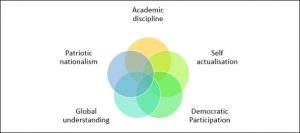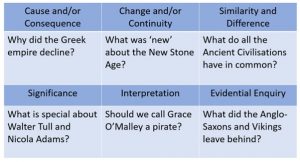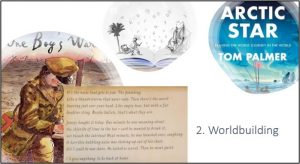
July 22, 2022, by Rupert Knight
Making History Count in the Primary Classroom: digging deeper into Ofsted’s primary history review.
Over the last year, Ofsted has published research reviews into a range of different subjects, designed to collate the most current and most helpful research. In the second of our University of Nottingham Primary Education Network meetings for 2022, Victoria Crooks led a session with a group of school leaders and tutors from the Primary PGCE course on the history review and its implications for practice. In this blog arising from the event, Rachel Peckover summarises ‘powerful knowledge’, principles of an effective curriculum, and different types of historical knowledge.
The purpose of history education
We began the session by considering the purpose of history education. Vic presented us with some of the different ways this is perceived in society:

• As an academic discipline – teaching children about the processes of history making.
• As a tool for developing self-actualisation – the understanding of our own identity, our place within society and our family heritage.
• As a tool for encouraging patriotic nationalism – a sense of understanding of our nationhood, instilling children with British pride and values rooted in the heritage of the country. This is at the centre of current debates and can be quite contentious as demands to decolonise the curriculum are seen by some as coming into direct conflict with this ‘purpose’.
• As a way of promoting global understanding, enabling children to enhance their participation in a democratic society through their knowledge of how our world and the relationship between states have come to be as it is today.
As teachers, we need to consider our own beliefs as to the purpose of history education because these will influence every decision we make about our curriculum content and the knowledge that we reveal to our children and support them to understand.
‘Powerful knowledge’
Over the last ten years, the idea of ‘powerful knowledge’ and its links to social and cultural capital (the idea that there’s a certain set of knowledge that children should have to enable them to access our society so that they can achieve their full potential) has increased in prominence.
This idea of ‘powerful knowledge’ was introduced into British educational debate by the sociologist Michael Young. He argues that the main purpose of schools is to teach knowledge that enables children to think beyond the limits of their own experience. This is particularly pertinent in history where a certain set of historical knowledge enables us to engage with the world.
However, there have been questions raised as to:
• who defines our ‘powerful’ historical knowledge;
• how we define what ‘knowledge’ means in history – the links between knowing, remembering and understanding;
• how we avoid one single narrative of our history being promoted above all others.
As a new model history curriculum is currently being prepared for key stages 1, 2 & 3, it is important to engage with these debates.
The History Research Review
While some argue that there are limitations to the research review (it can feel quite secondary in its approach and has had to ensure that it caters for differing views on purpose), its aim is to draw together what is known about really good history teaching.
There are two key questions asked by Ofsted when they look at a school’s curriculum:
• Is the curriculum appropriately broad and ambitious?
• Do pupils make good progress?
How does this relate to history in particular? What do we mean by an appropriately broad and ambitious curriculum? What does it look like for children to make really good progress?
Alongside the review, Tim Jenner, Ofsted HMI for history (who also has strong links with the Historical Association) has produced a blog to support schools in developing their offer and answering these questions. Vic summarised the key aspects as follows:
• Pupils enjoyed learning about the past
• The history curriculum was broad
• There was a focus on building blocks of progress
– knowledge that was essential to pupils’ understanding of new material
– role of substantive concepts
– explicit teaching of historical terminology
– foundation chronological knowledge: ‘mental timelines’
• Pupils with SEND were supported
It is important to look at the National Curriculum beyond the exemplifications of content and pay due attention to the purpose of historical study, which states that:
A high-quality history education will help pupils gain a coherent knowledge and understanding of Britain’s past and that of the wider world. It should inspire pupils’ curiosity to know more about the past. Teaching should equip pupils to ask perceptive questions, think critically, weigh evidence, sift arguments, and develop perspective and judgement. History helps pupils to understand the complexity of people’s lives, the process of change, the diversity of societies and relationships between different groups, as well as their own identity and the challenges of their time.
The National Curriculum aims identify three different types of knowledge that should be developed:
• Substantive knowledge
• Substantive conceptual knowledge
• Disciplinary knowledge
Substantive and disciplinary knowledge
Substantive knowledge: These are the historical events, people and the places that our children are going to learn about. When we make decisions about what is in our curriculum, we are defining the historical narrative that children are going to encounter and that’s why understanding our own perspective on the purpose of history really matters. We can choose to give children an Anglo-centric view of Britain’s past, or we can choose to give them a much more global, decolonised perspective.
Vic encouraged us to think about our curricular coherence: how what we’re teaching in history connects to the other things that pupils are learning across the curriculum because all of those other topic areas are going to influence the schema that they develop to enable them to understand the world and to understand their place within it.
Substantive concept knowledge: (sometimes called first order concepts): These are the abstract concepts that allow us to frame historical ideas and to talk about things that happen across time and not just within one context; e.g. empire, civilisation or monarchy.
As teachers, we need to be thinking about how we can incrementally build up children’s appreciation and understanding of these ideas as they encounter them time and time again throughout the curriculum. They need to be planned for and they need to be thought about strategically.
Michael Fordham has created lists of substantive concepts that children could encounter in Key Stage 2 and 3 which can be found here.
Disciplinary knowledge: is knowledge which enables children to understand how historians construct knowledge by studying the past. This involves the application of the second order concepts (also known as disciplinary concepts) to answer historical question:
In the national curriculum there are six disciplinary concepts identified. It’s these disciplinary concepts that we should be using as the driver for questions to create true historical enquiry.

Vic signposted us to the Historical Association who provide an introduction to the disciplinary concepts and support with historical rigour. The work of Bev Forrest can also help with this.
Key principles of an effective history curriculum
Vic went on to share with us her principles of an effective history curriculum.
• Chronological coherence matters (beware interleaving!)
• Worldbuilding is our aim – narrative is powerful too!
• History needs enquiry
• History is not just the past – we need both substantive and disciplinary foci
Chronological Coherence Matters

Pupils should have anchors for their chronological awareness, allowing them to develop a sense of periodisation. Whilst it can be tempting to focus on timelines, chronological awareness involves so much more than being able to put events in date order.
For young children, books like ‘My Grandmother’s Clock’, whilst not historical in intent, can be used to secure children’s understanding of the passage of time. For older children, grounding the passage of time using a concept like ‘how many grannies ago’ an event took place (e.g. the events of WW2 took place in the time of your great, great Granny) can also help secure how near or remote events are to their lives now.
Vic did issue a note of caution about interleaving (the mixing up of topics to aid their retention). Flitting backwards and forwards between different eras, without the context of a planned change and continuity enquiry, can be really disruptive to developing children’s understanding of how time progresses and of different periods; they need to be able to see the changes that develop.
World building

The notion of world building is absolutely critical for children. If they’re to understand history properly, then they need to be able to envisage that the period of time that they’re learning about is different from the world that they inhabit today and contingent upon the events and understanding in that period; they need to have a really secure sense of what has changed and what has stayed the same.
Vic explained that a powerful way to do this is by getting them to dwell in images and narrative descriptions, to build up visual mental picture of what different periods looked like. Books such as ‘The Street Through Time’ are an effective resource for this.

Vic also discussed the power of narrative. Historical fiction is an incredibly useful tool for helping to unlock children’s sense of the past. Narrative really gives a sense of being immersed in that world. It is much more powerful than presenting children with a list of facts about the trenches or a set of dates that they’ve got to put onto a timeline.
However, as teachers we need to be really clear about whether we are using a book for historical purposes or for its literary qualities, as some texts are more historically accurate than others and there is a real danger of embedding ahistorical thinking and misconceptions – for example there are compelling reasons why ‘The Boy in the Striped Pyjamas’ should not be used to teach the Holocaust.
History needs enquiry
Vic discussed history as a discipline and the need to get children to engage with enquiry and ask perceptive questions about the past because that’s what historians do. We need to support children to understand that history is the process of making sense of the past.
Vic shared an article by Michael Riley in which he discusses how to identify genuine historical enquiry. He argues that it needs to fulfil these three tests:
1. capture the interest and imagination of pupils;
2. place an aspect of historical thinking, concept or process at the forefront of the pupils’ minds;
3. result in a tangible, lively, substantial, enjoyable ‘outcome activity’ through which pupils can genuinely answer the enquiry question, e.g. what was new about the New Stone Age?
History is not just about the past
Finally, Vic told us that history is a discipline which requires this enquiry approach because historians are constantly re-examining the same periods, topics and focuses and discovering new lines of argument and debates. Linking back to the Ofsted research review, substantive and disciplinary knowledge are the underpinnings of this.
However, most of all she advocated for a history curriculum that inspires our pupils, sparking their curiosity and passion for the subject.
Some questions to ponder:
• Does your curriculum identify substantive, conceptual and disciplinary knowledge?
• How is this sequenced to ensure progression over time?
• Is chronological understanding carefully planned for?
• Do pupils have opportunities to carry out historical enquiry? Are there any challenges to this?
• Do teaching materials, including narrative texts, support the intent?
• Is your school engaging with the history teaching community via the Historical Association or Schools History Project?
Primary History Twitter handles to follow:
@Counsell_C (read pinned tweet)
@HistoryPrimary
@Mr_S_Tiffany
@Ramble14
@trionacheile
@CharteredColl
No comments yet, fill out a comment to be the first

Leave a Reply